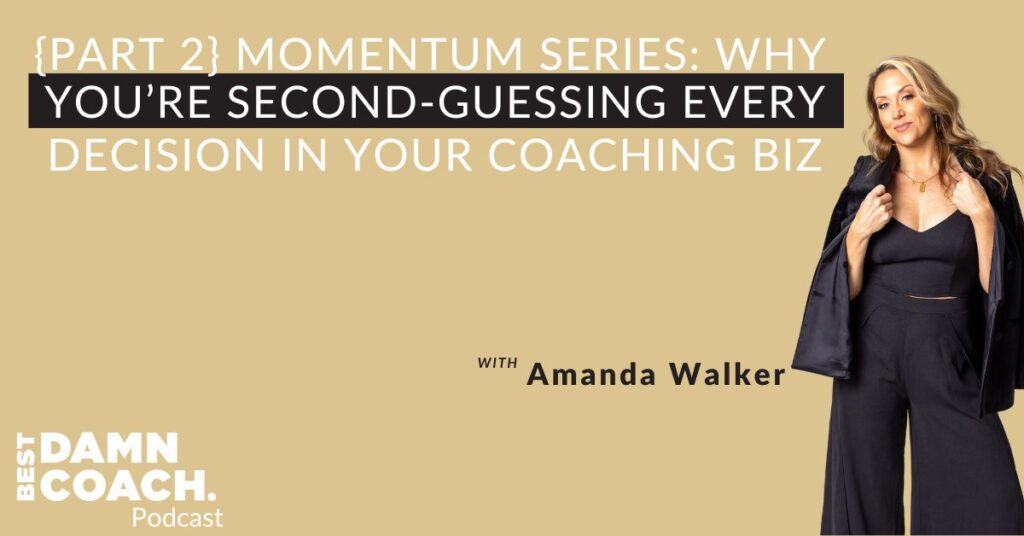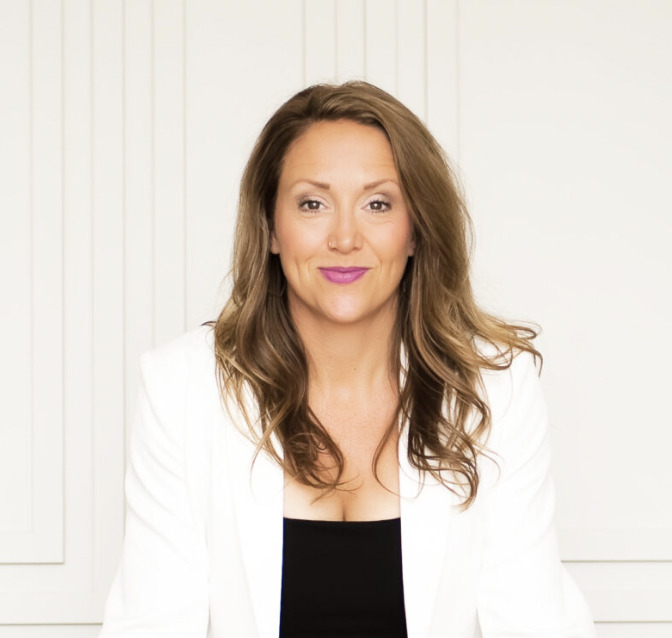Why You’re Second-Guessing Every Decision in Your Coaching Biz
If you’ve ever Googled “how to stop doubting myself as a coach,” you’re not alone. That paralyzing overthinking cycle doesn’t just steal your confidence – it’s robbing your business of momentum and your clients of transformation.
As a coach who’s worked with hundreds of other coaches, I’ve seen this pattern time and again: You don’t have a clarity problem. You have a confidence leak.
In this second installment of my Momentum Series, I’m breaking down why you’re caught in the cycle of second-guessing every decision in your coaching business – and giving you five tangible, practical tools to break free and start trusting yourself again.
The High Cost of Decision Fatigue in Your Coaching Business
We need to talk about what this overthinking is really costing you. It’s not just mild inconvenience – it’s actively sabotaging your business growth.
When you’re stuck in this second-guessing cycle:
- Time evaporates. What should take 30 minutes stretches into hours or days.
- Opportunities vanish. While you’re deliberating, the window closes.
- Energy drains. The mental toll of overthinking leaves you exhausted.
- Your audience becomes confused. Confused energy equals confused audience (and a confused mind says no).
- Your confidence tanks. And since confidence is contagious, this affects client attraction.
I’ve been there. Early in my business, I wasted weeks overthinking whether to start this very podcast. I journaled, researched, polled people, and spun in circles – until my coach asked me to close my eyes and imagine how my ideal client found me. The answer came in a whisper: “She heard you.”
That was my wake-up call that I wasn’t trusting myself. I was trapped in an overthinking spiral.
The 4 Root Causes of Your Second-Guessing Habit
Before we jump into solutions, let’s identify why this happens in the first place. There are four primary drivers of this confidence-draining habit:
1. Fear of Doing It Wrong
As coaches, we’re inundated with examples of others doing similar work. We see their websites, social content, and offerings – and subconsciously believe there’s one “right way” to do things.
This is particularly true for those of us who entered entrepreneurship with a “values level four” mindset (black and white thinking, structure-loving, box-checking). When we suddenly see endless possibilities for how to run a business, it can trigger massive self-doubt.
The truth? There are countless ways to create success. Just like you can cook a roast in a crockpot, pressure cooker, or oven – different approaches can lead to the same delicious outcome.
2. Fear of Judgment
Remember the last family gathering where someone asked when you’re going “back to a real job”? Or the subtle (or not-so-subtle) skepticism when you mentioned being a coach?
This fear of being judged for stepping outside conventional paths is powerful. My grandmother, until she passed at 100, would always express disappointment that I left teaching. But here’s what I learned: people will have opinions whether you play small or go big. In the wise words of Mel Robbins, “Let them.”
3. Lack of Strategy or Structure
Without a clear roadmap, your precious business-building time turns into aimless activity. You sit down for your dedicated hour, then flit between tasks without making meaningful progress on anything.
This lack of structure breeds decision fatigue. Without priorities, everything feels equally important (or unimportant).
4. Imposter Syndrome
“Who am I to…” questions plague nearly every coach I’ve worked with.
- Who am I to host a workshop? Will anyone come?
- Who am I to launch a podcast? Will anyone listen?
- Who am I to charge premium rates when I’ve only been coaching for a few months?
These doubts create hesitation, which breeds overthinking, which kills momentum.
5 Powerful Tools to Stop Second-Guessing Yourself
Now for the part you’ve been waiting for: my proven system for moving from overthinking to confident decision-making. These are the exact strategies I use with my Best Damn Coach students to help them build unwavering trust in themselves.
Tool #1: Create Your Decision Filter
Imagine having a personal tool through which you run every business decision. This filter instantly clarifies whether something deserves your attention or not.
Here’s how to create yours:
Step 1: Identify your #1 business goal right now. Is it getting clients? Growing your email list? Launching a group program? Gaining visibility? While ultimately all roads lead to more impact and profit, you need one primary focus.
Step 2: Check alignment with your values and audience. Does the opportunity or idea support both your values and what your audience wants?
For example, if I received an invitation to speak about fitness coaching in New York, I’d run it through my filter:
- Does it support my #1 goal (getting more coaching clients)? No, because I don’t offer fitness coaching anymore.
- Does it serve my audience? No, my audience wants coaching business strategies, not fitness tips. Decision: Clear pass.
Or if you’re contemplating another certification:
- Does paying $7K for this certification directly support your #1 goal of getting clients? Probably not.
- Could it be valuable later? Sure, but that’s not the question. Decision: Not now.
This filter eliminates the energy drain of uncertain decisions by giving you clear criteria.
Tool #2: Time-Block Your Decision Window
The time you give yourself is the time a decision will take. Two approaches work well:
For creation tasks: Set a timer. “I’m going to design this graphic in one hour. When the timer rings, it’s done – no more tweaking fonts and colors.”
For opportunity decisions: Give yourself a deadline. “I’ll decide whether to join this program within 24 hours, then move on.”
This prevents decision-making from stretching across days or weeks, stealing your energy and focus.
Tool #3: Fail Faster
This is our motto in the Best Damn Coach community – and it’s transformative.
The faster you fail, the faster you get feedback to inform your next move. Consider this:
- If you spend 7 months perfecting a workshop title before launching, you’ve wasted 6 months.
- If you launch with an imperfect title and discover no one shows up, you have valuable data to adjust.
- If people show up but don’t convert, that’s different data.
Every “wrong” decision becomes guidance for moving forward. This reframe – seeing failures as data points rather than disasters – creates immense freedom and momentum.
Tool #4: Turn Down the Noise
I recently worked with a corporate client who was overwhelmed by input from multiple coaches, her husband, boss, and me. She was paralyzed by conflicting advice.
We listed everyone providing input and identified her top three trusted sources. Then we created a plan to gently disengage from the others.
This might mean:
- Muting accounts that trigger comparison
- Unfollowing people whose advice conflicts with your chosen path
- Doubling down on 1-2 trusted mentors who truly understand your business
I’ve found that most growth comes from deep, long-term relationships with a few carefully chosen mentors rather than consuming advice from dozens of sources.
Tool #5: Read the Receipts
Start collecting evidence of your good intuition. Create an “intuition archive” where you document times your gut decisions worked out well.
Maybe you:
- Chose a partner who turned out to be perfect
- Took a job that advanced your career
- Followed a hunch that led to a dream client
- Made a seemingly risky investment that paid off
Your business intuition is the same intuition that’s guided you in other areas – you just have less experience applying it here. The more you practice (and the faster you fail), the more “receipts” you’ll collect proving you can trust yourself.
Great Coaches Build Your Intuition, Not Question It
This brings me to a critical point: the right coach doesn’t create dependency by making decisions for you. They help you build and trust your own intuition.
Yes, great coaches will question you – but they ask the right questions to help you find your own answers. They might share what worked for them while emphasizing that your path may look different.
That’s exactly what I do in my Best Damn Coach community. I help coaches build decision-making confidence so they can create businesses that work for their unique strengths and circumstances.
Your Next Steps: Building Momentum Through Confident Decisions
I challenge you to implement at least one of these tools this week:
- Create your decision filter
- Time-block a decision you’ve been avoiding
- Embrace the “fail faster” mindset
- Identify and limit your input sources
- Start collecting your “intuition receipts”
And don’t forget – I’m hosting a LIVE coaching session on May 7th at 9am Arizona time where I’ll coach you personally on whatever you’re feeling stuck on in your business. Whether you have a specific question or just want to be in the presence of like-minded coaches, I’d love to have you.
Register here: amanda-walker.com/getcoached
If this episode helped you gain clarity around your decision-making process, I’d be so grateful if you’d share it with other coaches who might be stuck in overthinking mode.



